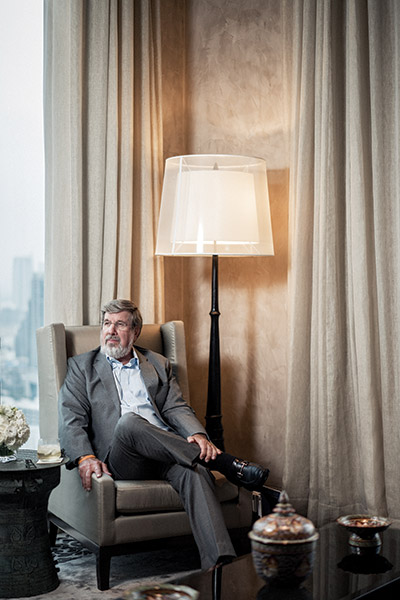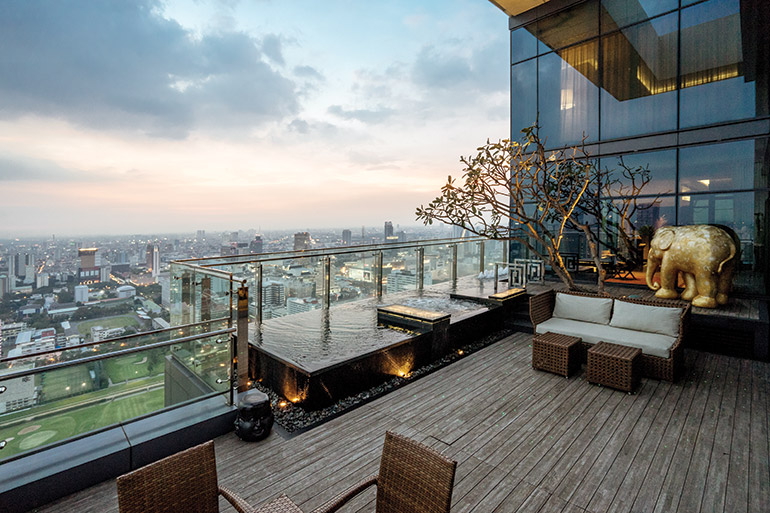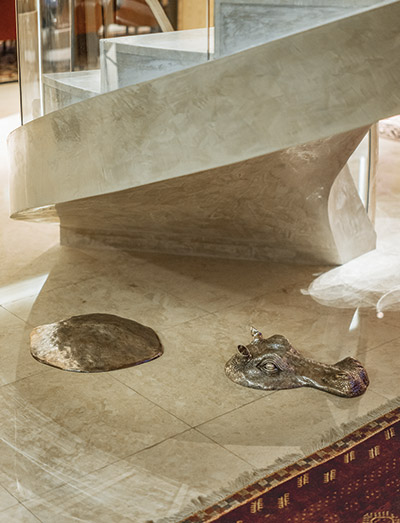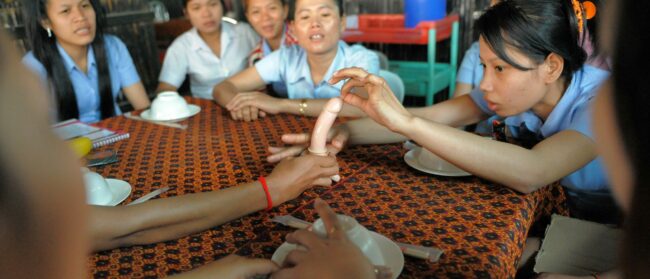
William Heinecke was running late for our meeting at his Bangkok residence, a striking two-storey penthouse atop the St. Regis hotel in the heart of Bangkok’s commercial district. I used the extra time to take in his extraordinary view. The penthouse looks west to the Royal Bangkok Sports Club’s polo and racing fields, which run up against Siam Square, MBK and Siam Paragon, three pulsing mega malls crammed with brands such as the Pizza Company, the Coffee Club, Burger King, Swensen’s, Charles & Keith and Banana Republic – a dizzying line-up of food and retail outlets that Heinecke either owns outright or operates as a franchisee. To the south, Heinecke has hotels in prime locations flanking the Chao Phraya river, while his stately dining room looks east to Sukhumvit Road, an energetic, tourism-fed pipeline brimming with even more Heinecke-backed businesses. The St. Regis belongs to him, as does the neighbouring Anantara Siam, part of the luxury hotel brand he established from the ground up. Heinecke, it seems, cannot only see all of shiny, sprawling Bangkok, he has actually had a hand in shaping the modern Thai metropolis.
A self-made billionaire, Heinecke is the founder and CEO of Minor International, a company that consists of 155 hotels, 1,800 fast food operations and more than 17 lifestyle brands. Recording $1.21 billion (THB42.4 billion) in sales for 2015, the company shows no signs of slowing down. In the third quarter of 2016, Minor International reported an 11% increase in profits over the previous year. While the Securities Exchange of Thailand has not yet released complete data for 2016, it appears the firm will continue to chart record total earnings, and net profits will keep inching up.
Fifty years ago, Heinecke’s penthouse and the Bangkok cityscape it faces did not exist. Both he and the city got their start in the mid-1960s, when favourable political and economic conditions unleashed Asian economies on the world. For the next five decades, he negotiated bumpy terrain pockmarked with military coups, recessions and natural disasters. Yet last year, Forbes named Heinecke Thailand’s 11th-richest man, a notch up from his 2015 ranking, with a net worth of $1.5 billion.
In the plethora of newpaper interviews and broadcasts that he has been quoted in, Heinecke seems particularly satisfied with the fact his success has been, for the most part, self-made. A Thai businessman once told me that Heinecke’s ascent is unusual because “he isn’t Thai… yet he managed to succeed in a Thai business environment. He didn’t just start at zero, he started at negative.”

The son of an American foreign service official and a journalist, Heinecke lived in Malaysia and Hong Kong before completing high school in Bangkok. “I fell in love with the city. Living here and doing business [in Thailand] has always seemed normal to me. There is no Plan B to live anywhere else,” Heinecke said, shortly after arriving for our interview and pouring two glasses of Johnnie Walker Black Label on the rocks. Proof of this point comes from the fact that in 1992 he turned in his US passport and became a naturalised Thai citizen.
In 1967, he chose go-kart racing and selling advertisements for a Bangkok newspaper over a university degree, thriving in both pursuits. By 1970 he had launched Minor Group (which later became Minor International), diving headfirst into the big leagues by prospecting franchise deals with multinationals. Heinecke took the company public early on, a strategic move that helped the company finance deals and diversify.
“I began with great speed because Thailand in the 1960s and ’70s was growing at a phenomenal rate. There was a huge opening,” he said. When an early deal with Pizza Hut went sour, Heinecke hit back by launching the Pizza Company, a chain that caters to the Thai market and is among the top-grossing restaurant brands in the country.
Heinecke’s success can also be attributed to a connection forged early on with the Crown Property Bureau (CPB), the Thai royal family’s business arm. This goodwill helped him secure lease agreements to build properties on Crown land (the CPB owns more than 1,200 hectares of prime real estate in Bangkok and three times that around the rest of Thailand). The late King Bhumibol Adulyadej held a 2% share in Minor International, while various CPB beneficiaries hold up to a 4% stake. In 1999, the CPB backed Heinecke when Goldman Sachs attempted a hostile takeover of Rajadamri Hotel – a Regent hotel in which Heinecke held a 25% share – allowing him to amass a majority and buy out Goldman Sachs’ 41% at $1.9m. While most of Minor’s revenue still comes from Thailand, the company now pulls in roughly a quarter of its earnings from foreign holdings, a figure Heinecke would like to see grow to at least 45%.

The tenacious 67-year-old has also had to grit his teeth during less-rosy times. Under his watch, Minor has weathered nine coups in Thailand and lost a Phuket hotel to the 2004 tsunami. Street riots in 2010 forced the temporary closure of businesses in central Bangkok for a few days, while the 2015 bombing at the city’s Erawan Shrine struck frighteningly close to Anantara Siam and his St. Regis home. In 1997, Heinecke came close to personal bankruptcy when Thai markets plunged to rock bottom. More recently, the rise of the military junta, the October death of Thailand’s revered monarch and the ascendency of his son, King Maha Vajiralongkorn, have created an atmosphere of anxiety about the country’s future. Thailand is now considered Southeast Asia’s most sluggish economy with annual GDP growth at just 3.2% last year, while foreign direct investment fell by a staggering 78% in 2015. Still, none of this seems to have slowed Heinecke down.
“There have been many changes in Thailand,” he said, “but very little of that has really affected businesses here. You wouldn’t have such a dynamic city if it had. In countries that we operate, there’s always something [political] happening. I’m not as uncomfortable as some people because I’m used to a certain amount of volatility.”
Heinecke also stressed the importance of selling ideas: “You have to make people buy into what you are doing.” Emphasising his point, Heinecke drew upon a metaphor used by former US president Dwight Eisenhower: “If you push a string, nothing happens. You have to pull it to get it to move.”
These days, he has upgraded from go-karts to sports cars, and his thirst for fast-moving objects and swift deal-making shows no signs of diminishing. Racing his antique Ferrari is as close to relaxing as the self-professed workaholic gets. “I get nervous when the phone goes silent, when I don’t get texts, emails, faxes,” he said, admitting with a grin that he is guilty of driving his racing car and texting prospective clients simultaneously. For Heinecke, it seems business is always racing.


